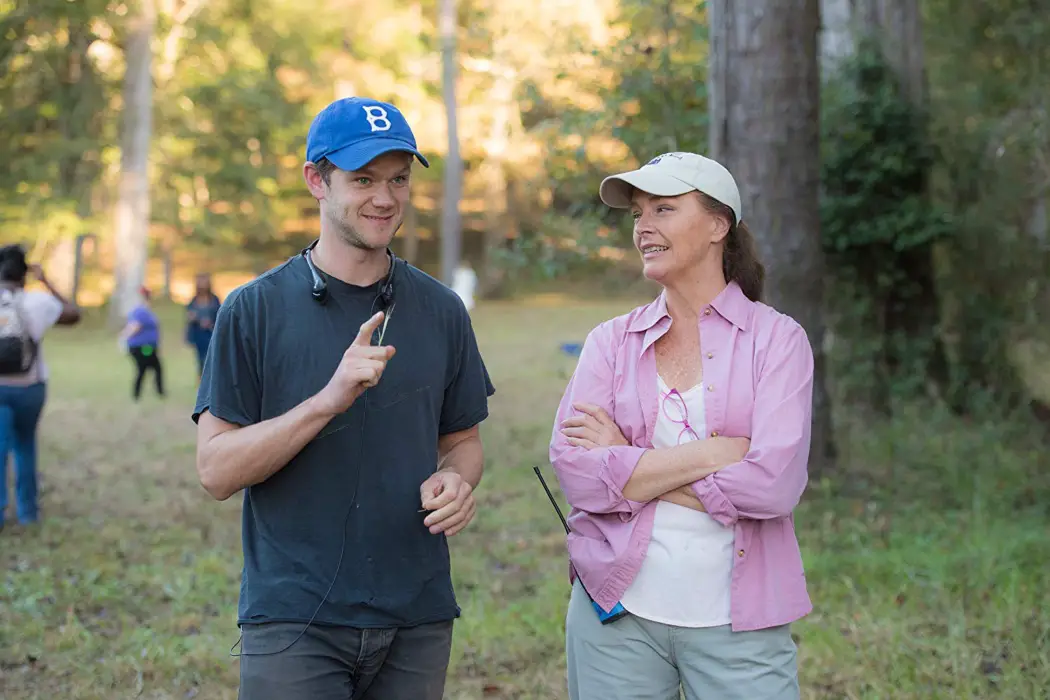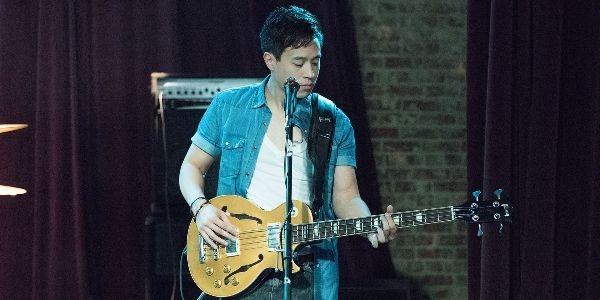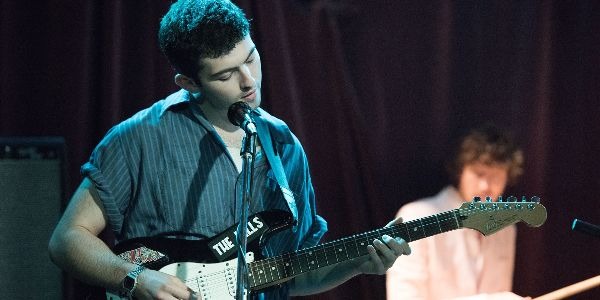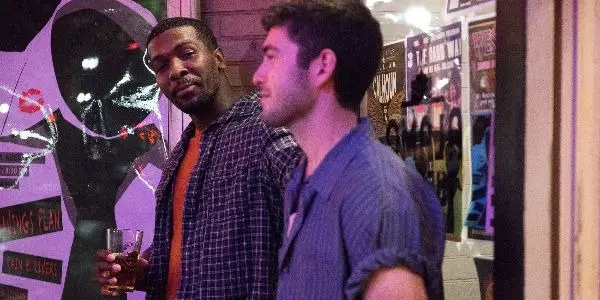Interview With Joseph Cross, Director Of Summer Night

I'm a geeky, yet lovable film fan who adores horror…
I had the pleasure of chatting with the director of the upcoming film Summer Night, Joseph Cross. Known primarily as an actor, Summer Night is Cross’ first foray into directing (review here). We chatted about working on Big Little Lies, casting young actors and crafting characters.

Maria Lattila for Film Inquiry: The first thing I really wanted to ask you, because you’re also on actor, is why did you want to move from acting to directing?
Joseph Cross: It was really the script. When I first read Jordan Jolliff’s script, I was approaching 30. I’d been acting for so long I was starting to think I was starting to think about how I could be useful in other parts of the filmmaking process but when I read Jordan’s script it just stuck with me because it was similar to the way that I grew up and I thought it was really honest, really nuanced and interesting and I loved the idea of a big ensemble.
I was simultaneously working with Jean- Marc Vallee on Big Little Lies and he’s just like one of the most incredible people to watch on that show. Everything kind of came together at the same time and after working on the script a little while with Jordan I said you know I really think that I should direct it, I want to direct it. Jordan was onboard with that and we asked James Ponsoldt, who Jordan was working for at the time, if he would be our executive producer and James was kind enough to say yes. From there we were able to get the ball rolling.
Is there anything specific that you learned from Big Little Lies and working with Jean-Marc?
Joseph Cross: He’s just completely unafraid of breaking any filmmaking convention especially in support of performances and he’s just electric. You’ve just got this otherworldly energy on set.
You’ve also got such an incredible cast of these up and coming actors and they all have such great chemistry with each other. So how was the casting process of getting them all together?
Joseph Cross: It was good. I didn’t use a casting director, I just did it myself. It meant looking through other films and TV shows that I thought would have people in it that could be right and looking through lists that other people have put together, speaking with agents and managers. I was looking through the cast of The Stanford Prison Experiment and I came across Callan (McAuliffe). I had remembered Callan from I Am Number Four. I remember thinking that young man is a very, very talented actor, Callan was probably 14 at the time. I was watching interviews and watching clips of Callan. I thought this is my Taylor. It was probably after 11:00 at night by the time I looked through everything that I could find. I just emailed his manager and he emailed right back and he liked the part and so they set a meeting and as that meeting was approaching, I found Ella Hunt and I looked for her material and stuff. She was just extraordinary. I got to lunch with Callan and he said he wanted to do it and he asked who I was thinking for Dana and I said I found this actress Ella Hunt. And he said “Ella? I love Ella! Ella and I worked together four years ago!” And it turned out that the two of them had this history and this pre-established relationship.
So when we cast them both so much of that chemistry would just begin. It was just by a stroke of good fortune that was already there. The two of them have a very charming chemistry.
Another performance that was really impressed by was Ian Nelson as Seth. He’s probably the most conflicted character in the film and he’s so great in the role. So what kind of conversations did you have with him about the character and his performance?
Joseph Cross: I tried to limit the auditioning. Whenever I could just give somebody the part I would. I knew Ian was right, but I wanted to make sure he could do the comedy as well. And he sent me this audition tape with this really wonderful improv that ended up in the film. I knew he was right. So then we got on a phone call and we talked a lot. Once we got to Newnan we went to a four hour dinner and went through the whole script and talked through everything.
And that’s Ian’s brother’s guitar that he’s playing in the film. And as well as having to do a lot of the emotional lifting along with Analeigh Tipton, Ian also had to do a lot of stuff with the music, he had to spend a lot of time learning the parts on guitar that were a little bit more complicated. Ian was just a very committed, very diligent actor who gives it his all.

There’s also a lot of anxieties about taking responsibility and parenthood. So why did this resonate with you? You did mention turning 30 was quite a big deal for you.
Joseph Cross: When I first read the script, my wife and I were considering kids. When I decided we were going to do it, that I was going to direct it, it was just after I found out Audrey, my wife was pregnant. And then when we shot the movie, we had already had our daughter Amelia. Audrey and Amelia were down in Newnan with me and Audrey actually, through a set of circumstances, became a producer on the film.
She went from just from being a painter and a fine artist to producing this movie which led her onto a new career path that’s been really inspiring for her. So yeah becoming a parent is the main struggle in the film, what happens when you change in that way finally, from childhood into adulthood or when you don’t, which you see in Justin Chatwin’s character. I think that was a big driving force for me
It is essentially very much a coming of age film, but they tend to normally be about high schoolers. Is that why you wanted to focus on older, not quite young but also not old, not fully grown up people?
Joseph Cross: You’re right it’s always high school. I really wanted to explore a different time when you come of age and especially in America and especially this generation that I saw with a lot of my friends. I didn’t graduate college but all my classmates graduated in 2008 right after the crash. And so the job market was so limited in America. You were watching people really struggle to come of age and the way they have seen Generation X and their parents’ generation come of age and get a job, buy a house and get your car, have kids. That wasn’t really an option for the next group of graduates.
So I think that is part of what made me want to explore this specific age group. Personally, in my early 20s I felt more lost during that period of time than I did any time before or after. It was something that I wanted to return to and explore and try to figure out why that was.
The thing that I really sort of enjoyed the most is even though I’m a woman I feel like I’m always drawn to male stories and I thought the film had this fascinating male perspective on themes that are quite often associated with women such as the pregnancy and Ellar Coltrane’s character’s love triangle. Do you think has that perspective and why it has that?
Joseph Cross: It’s definitely a story about more sensitive men. It’s not a sob story, it’s about these like two people who’ve been young men they’re very poetic souls I think for the most part. Artistic souls with it with this creative musician component to them. I guess it’s about more sensitive young men than I think you see portrayed. But I do think the young men struggle with all these issues. We just don’t see it so much in pop culture, I guess.
James Ponsoldt, who directed The Spectacular Now is an executive producer there. Is there anywhere that we can see his influence particularly?
Joseph Cross: James with The Spectacular Now really did the young adult coming of age story in a way that nobody had yet. I mean he’s dealing with really heavy themes in that film in a way that feels natural and I think that there was a leap in the genre with that movie. Young people did want to see a darker more intense perspective. And I just I love James’ filmmaking and I think he’s an extraordinary person. I’m sure it’s all over the movie. I couldn’t point to specific places.
There’s a scene at the Alamo when I think it’s first Rabbit and then later it’s Seth talking to Luke. He mentions that he’s got a family at home and children at home. You don’t really see him much in the film so that made me think how the editing process was and if there were a lot of material that didn’t make the final cut the film.
Joseph Cross: Well funny enough everything that Khris (Davis) shot is in the movie. His part was always meant to just represent these characters the life that could be more than the life they’re living in. They’re still living in Andy’s, Justin Chatwin’s character’s version of what life could be. So Khris is really meant to just infuse this perspective quickly and then let the characters sit with it so actually nothing of Khris’ was cut out and there was a lot that he was able to improvise that I could take to bolster his part.
But there is a lot more material that didn’t make it into the movie. A great scene with Hayden Szeto and Ellar Coltrane. Some really great stuff with Victoria and Ellar, some really lovely stuff with Ella and Callan which was so difficult for me to lose, it really broke my heart. I loved everything that they had done. There was a lot of movie that didn’t make it into the movie that I loved but it just in terms of pacing and you know the feel of it, it just didn’t ultimately fit.

Andy is another character that I was very drawn to, because believe it or not I run a bar as my day job. I felt very seen by that character, kind of being the oldest guy in the room at the age of 30 and being like the life of the party, but it’s getting a little bit sad by that point. How much did Justin put into that and how much was already in the script?
Joseph Cross: A lot of it was in the script in terms of the situation and who the character is and then Justin added a lot in terms of improvisation and building upon it. I’ve known Justin for over 10 years now. We’ve got mutual friends that introduced us when I first moved to L.A. I just knew who he was. And I know he’s an adventurer and he’s a wanderer and a free spirit and you know a very philosophical person as well as being really funny. When I read the script I was like “Man if I could get Justin to do that you know I think he would do an incredible job” And thankfully he threw his dog in the truck and he drove to Newnan, Georgia from L.A. and then I think he drove off to Idaho from there. That’s kind of who he is.
You’ve got quite a lot music in the film, this big chunk of it is set in The Alamo in the middle of the film. Was it always really important to you to have all those music scenes and the songs in the film or did you think that maybe they might be something expendable?
Joseph Cross: I never felt they were expendable. The music is the catharsis. I mean the music is the true joy in the characters’ lives, I think that’s what’s driving all of them. And certainly driving their optimism and the way we cast the band and we picked the songs were very specifically tailored both sonically and lyrically to the dilemmas of the characters we’re going through at the time and you see it most clearly with Ian’s character. Music was always a big part of it.
And I always knew I wanted to have essentially a rock show in the middle of the movie and experience it as much in real time with the characters as we could without doing it like you’re just watching a music video. And then building the soundtrack which was equally important to me. Most of the music is source music that you think the characters themselves were listening to, what are they playing, what are they singing about. This was a big window into who these people were.
Are these characters something that you’d maybe like to visit at some point in your career?
Joseph Cross: I would love to revisit these characters at some point in my career. I mean especially the actors. We debuted at festival called RomCom Festival here in L.A. and I got to spend some time with them again. I just remembered how much I love all of these actors and how much I loved working with them. It would be a dream for us all to get together in some capacity.
Yeah that might be might be a good one to see so again 10 20 years down the line for them. What’s happening with them now and if there’s another coming of age kind of thing going on there.
Joseph Cross: That’s a great idea. I would love that. I would I would happily return to this world.
I have to ask this. With Jameson’s character his date is Harmony and his ex is Corin. So is that a reference to director Harmony Korine and why?
Joseph Cross: The only other person that spotted that is Ellar Coltrane himself and he asked screenwriter Jordan Jolliff. I had never thought of it like I had never even noticed it. And I thought Jordan, you sneaky little friend of mine, you put this into the movie without me knowing. And Jordan said “That’s totally by accident. I didn’t even know that either!” Maybe somewhere in Jordan’s unconscious he knew but he wasn’t aware of it either. Ellar himself was the first person to point it out.
Are there any other influences, any film makers or films that you looked up to?
Joseph Cross: I wanted to move the camera in a way that gave the night a lot of energy. So you know there’s sort of the obvious list of filmmakers that are exceptional at that. I watched a lot of Alfonso Cuaron’s movies leading up to this. I re-watched Paul Thomas Anderson’s movies and Robert Altman movies, looking over who had done the ensemble in a similar way and done it really well.
I did want to also ask you, this is your first feature film as well so how was that experience for you?
Joseph Cross: It was wonderful. I spent a very long time reading and learning and prepping the movie. It took two years to get it made and we spent every waking moment with the script or filmmaking books and watching movies, anything I could get my hands on that might give me a clue to what I was in store for and then prepped the movie meticulously as I could, knowing that if something cooler were to happen on set, we would throw all that away for what we got in the moment. I have been on sets my whole life. The pace of it all, the language of it all comes naturally to me and working with actors I think came really naturally to me as well. And then I didn’t know how much I was going to love being in the edit with our editor Raymond Wood. I can’t really explain it, it’s just this wonderful feeling to now be able to build the whole thing. I think there’s a famous Ang Lee-quote where he says filming the movie is the grocery shopping and the edit is where you make the meal. And that is really what it felt like. I just love that process, piecing it all together.
I think I’m out of time with you unfortunately but it was so nice to talk to you!
Joseph Cross: Thank you so much. I’m not sure when, but it’s coming out on Sky TV in the UK.
Film Inquiry thanks Joseph Cross for taking the time to speak with us.
Summer Night is out on VOD 12th July.
https://www.youtube.com/watch?v=j9FDmJhrqtc
Does content like this matter to you?
Become a Member and support film journalism. Unlock access to all of Film Inquiry`s great articles. Join a community of like-minded readers who are passionate about cinema - get access to our private members Network, give back to independent filmmakers, and more.
I'm a geeky, yet lovable film fan who adores horror cinema, musicals and my dog Geordie La Forge. I'm from Finland, but based in London.













